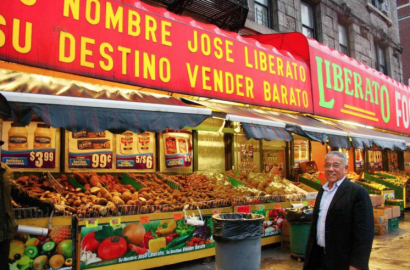Whether it’s the corner bodega, neighborhood restaurant, nail salon, bakery, clothing store or dry cleaners, small immigrant-run businesses provide more than just convenient local services, they also boost the national economy.
A new report released by Americas Society/Council of the Americas (AS/COA) shows that immigrants play an increasingly significant role in Main Street businesses in the U.S. Immigrants account for 28 percent of Main Street business owners nationally.
The report, Bringing Vitality to Main Street: How Immigrant Small Businesses Help Local Economies Grow finds that between 2000 and 2013, immigrants were responsible for all of the net growth in Main Street business across the nation, as well as in 31 of the 50 largest U.S. metropolitan areas. Main Street immigrant business owners earned $13 billion in 2013.
“This report confirms and quantifies what we see in our daily lives: that immigrants are crucial to the economic vitality and success of cities around the country.” Said Susan Segal, AS/COA President and CEO.
Jose Liberato, in front of his grocery store in NYC Photo: Camila Osorio
The study uses figures from the U.S. Census, the American Community Survey, and the Survey of Business Owners and includes all immigrants; documented and undocumented. The report acknowledges that while there are important distinctions among these groups, all of them include business owners in varying proportions.
According to the report, businesses run by immigrants also contribute to the revitalization of metropolitan areas with diminishing populations and waning local business sectors. For example, in cities like Philadelphia, Minneapolis–St. Paul and Nashville, immigrant businesses have played a significant role in reversing decades of population decline and have helped reestablish a commercial base for neighborhoods. They increase the tax base and spark further economic activity through increased consumer spending.
“These are types of businesses that don’t often get a lot of attention from economic development officials and don’t have huge profits; but they play a big role in neighborhood revitalization, and they can be an important economic step up for entrepreneurs.”
“These are types of businesses that don’t often get a lot of attention from economic development officials and don’t have huge profits; but they play a big role in neighborhood revitalization, and they can be an important economic step up for entrepreneurs,” says the author of the report, David Dyssegaard Kallick, Senior Fellow and Director of the Immigration Research Initiative at the Fiscal Policy Institute.
The study also talks about how local small businesses generate neighborhood-level economic growth by making areas more attractive and safer places to live and work.
Aurora Anaya Cerda who owns La Casa Azul, a local bookstore in East Harlem, says that local businesses build the character of a neighborhood.
“In any neighborhood, in any part of the country, you don’t want to visit and see the same businesses in every city. You don’t want to go and see the same type of pharmacy or the same type of café. You want to appreciate and really value what makes that particular neighborhood unique…. and what makes East Harlem unique is having so many cultural spaces and so many different galleries, museums, coffee shops and mom and pop stores that really sustain this community.”
The research report concludes that while debates around immigration at the federal level receives the most attention, looking at best practices and guidelines to maximize the potential of immigrant small business owners should be an integral part of economic and cultural development strategies for communities around the country.
